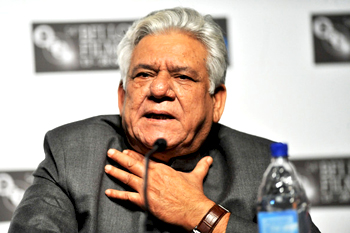Mumbai, Oct 3: Veteran actor Om Puri and director Nagesh Kukunoor have come out in support of Pakistani actors, saying art and politics should be kept separate and banning the artistes will not change the situation.
 Puri said Pakistani artistes are not working illegally here and if they are sent back, Indian producers, who have signed them for their films, will suffer heavy losses.
Puri said Pakistani artistes are not working illegally here and if they are sent back, Indian producers, who have signed them for their films, will suffer heavy losses.
"When the government is taking an action, we all should stay quiet. It hardly matters if we send back the artists from Pakistan, who are working here, or let them stay. I have been to Pakistan six times and have met people from all strata," the 65-year-old actor said here.
"I have always received love and warmth. If the Pakistani actors leave the projects they are doing here in middle, then people in India (filmmakers) will also face financial loss. Hence, this is insignificant. The actors have not come here through any illegal way. They have valid visa. But, if the government will ask them to leave, then it is different," he said.
Filmmaker Nagesh Kukonoor said though the situation between India and Pakistan is complex, he believes art should be kept away from politics.
"I have always believed that art should stand alone. Even if you take the worst periods in a nation's history, World War II, art still had its voice. I don't think the two should be mixed.
"Having said that, the India-Pakistan situation is an extremely complex one. We are all part of the same country. 60-70 years is a very short period to actually find some kind of peaceful common ground."
Their remarks came days after superstar Salman Khan opposed the ban on Pakistani actors, saying they are artistes not terrorists.
The film industry has been divided on the issue of banning Pakistani artistes in the wake of Uri attack. Actor Randeep Hooda, filmmakers Ashoke Pandit, Anupam Kher are among those who have backed the ban.
Hooda tweeted that Pakistan should be culturally isolated.
"We are trying to isolate Pakistan economically & diplomatically so the cultural isolation must follow #BanPakArtists #IndiaComesFirst #India," he wrote.
Filmmaker Madhur Bhandarkar said though he believes that art has no boundaries, the situation right now is such that nothing is bigger than the country.
He also said that Pakistani artistes, who have worked in India should condemn the Uri attack.
"Definitely the artists are not terrorists, and I believe
that art has no boundary but the situation today is very different. When you see our 19 soldiers have been killed, and when we see the whole scenario... I feel a lot of Pakistani artists who work here they should have condemned the attacks on India over the years.
"When they can condemn US attack, when they can condemn Istanbul, Paris (attacks), all those attacks then why not India? My problem is that. When Peshawar (attack) happened, everybody in India condemned. So, if the Pakistani actors feel it (the attack) is happening over here, they should at least tweet about it. Right now I think nothing is bigger than the country.
Actor Nawazuddin Siddiqui, when asked if Pakistani actors should be allowed to do work in India, refused to be drawn into the controversy.
"This is our government's job. Our government has a lot of expertise who look after these matters and policies. Being an artist I have no opinion on this controversy. This is not my job. Government decides it and it is their duty," he told reporters at an event in the capital.
The debate began after Maharashtra Navnirman Sena demanded the ouster of the artistes from the neighbouring country.
Recently, the Indian Motion Picture Producers Association also announced ban on the actors and technicians from the neighbouring country till things don't get normal between the two nations.






Comments
Add new comment